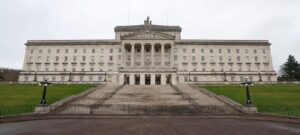 After a two-year boycott by the main Protestant party, the formation of a government in Northern Ireland is finally within sight.
After a two-year boycott by the main Protestant party, the formation of a government in Northern Ireland is finally within sight.
A Government in Sight for Northern Ireland For two years, the main Protestant party boycotted the formation of a government in Northern Ireland. Now, they have lifted their veto. Sinn Fein is likely to come to power, as they seek reunification with Ireland.
For over 700 days, there has been no regional government in Northern Ireland. Important political decisions could not be made – for example, public servants and teachers in England have long received salary increases. In Northern Ireland, a similar agreement could not be negotiated due to the absence of a government.
The strain on healthcare professionals in the national health service has once again increased dramatically, with patient waiting times at an all-time high. Christine Campbell had to wait five months for a doctor’s appointment, and then cancer was diagnosed. “Poor people, in particular, are at a greater risk because there is no government,” she told a BBC reporter.
DUP Ends Blockade
This is now set to change. Finally, the Parliament is coming together. The impasse is coming to an end. This has been made possible through a compromise. The largest unionist party, the DUP, has ended its blockade, and the UK government has reached a deal. According to the agreement, goods going from England, Wales, or Scotland to Northern Ireland will no longer be subject to checks.
There had been sporadic checks in place. This was intended to prevent goods from Great Britain entering the Republic of Ireland and thus the European Single Market if they did not meet European standards. This issue is now believed to have been resolved.
This was particularly important for the unionists, who advocate for Northern Ireland to remain part of the United Kingdom. They feared the gradual detachment from Great Britain and saw border checks within the UK as obstacles for businesses and, above all, as a signal of separation.
The way is now clear for a new parliament and a government that was elected in May 2022 but could not convene.
Sinn Fein Pursuing Reunification with Ireland
The new “First Minister,” equivalent to the Prime Minister of Northern Ireland, is Michelle O’Neill. She is the deputy party leader of Sinn Fein. The party advocates for reunification with the Republic of Ireland. The party’s electorate has a Catholic influence and often has Irish republican ties.
Sinn Fein becoming the largest party in 2022 caused a small earthquake: It was the first time that republican forces became the biggest party in the Northern Irish parliament. Previously, the London loyalist DUP was the largest party. Sinn Fein’s party leader, Mary Lou McDonald, recently stated that reunification is now “within reach.”
Many Northern Irish Oppose Reunification
However, there are many arguments against reunification being really within reach. A referendum would need to precede any unification. In a survey conducted for The Times newspaper, 30% of respondents said they were in favor of unification, while 51% were against it. Many Northern Irish people believe that the status quo ensures security and prosperity. The reunification process would be politically demanding and could reopen old wounds between communities. Different pension and healthcare systems would need to be harmonized.
In the Republic of Ireland, there is indeed a position that in the event of reunification, many problems – including financial burdens – would be taken on. However, Sinn Fein could also become the largest party in parliamentary elections in the Republic of Ireland.

